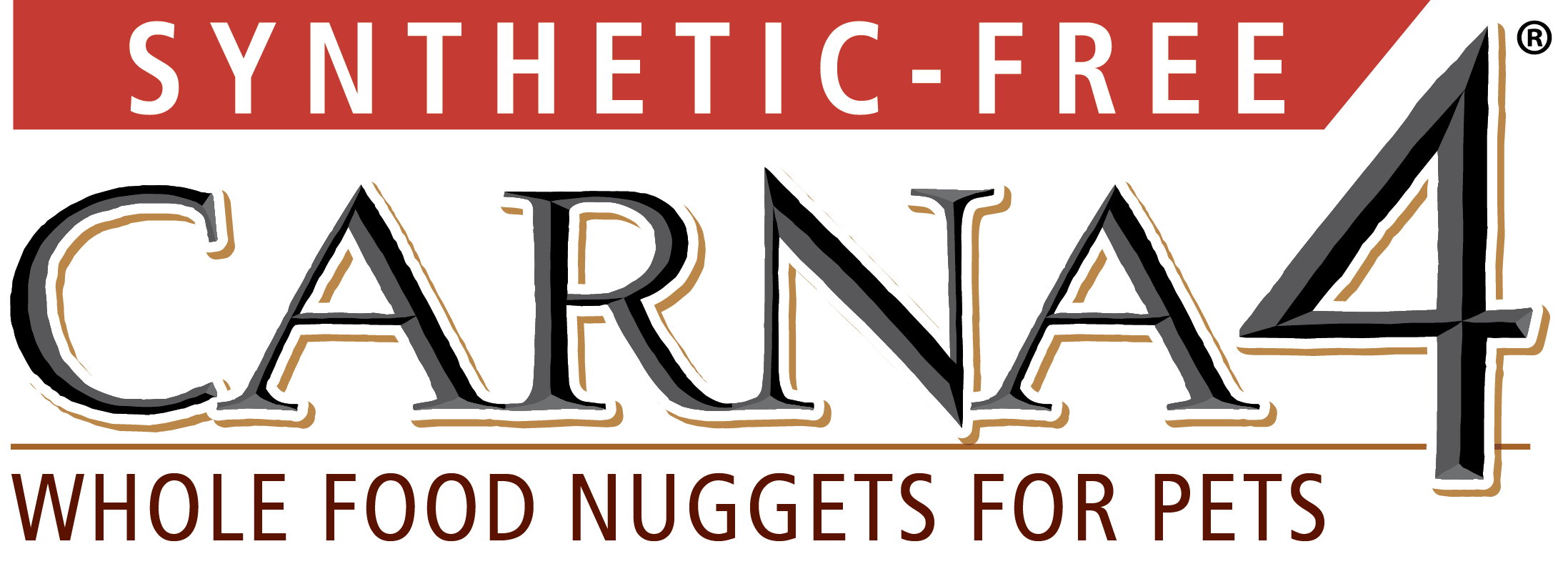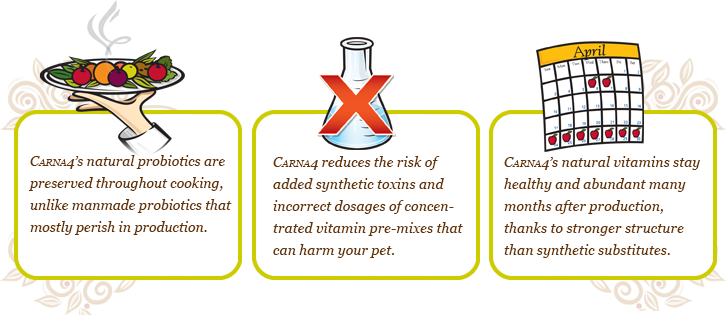Did you know that most pet foods, even most of the natural, holistic, grain-free or organic brands, contain vitamin and mineral “pre-mix” made from totally synthetic compounds that are almost all produced in overseas factories? This is how most pet food companies’ labels meet the nutritional requirements set for dogs and cats after intensive processing of ingredients.
Until now, the only way to avoid possible contamination from additives was to cook at home for your pet. Today you can avoid these risks with Carna4.
More Benefit & Less Risk for Your Pet
Most nutrients, such as vitamins, minerals or probiotics (“good bacteria” needed for healthy digestion) are more effective when they come from natural food, like Carna4’s sprouted seed mix, because the body needs the full array of micro-nutrients that are present in the whole foods in order to get the nutritional benefits. An individual vitamin or mineral that has been chemically isolated in a laboratory has a different physical structure than its whole food counterpart and the body recognizes the difference by rejecting the synthetic compound. Trying to absorb isolated vitamin compounds is a little like trying to get across town on a wheel that has been removed from your car: it doesn’t work unless it is attached to all the other parts of the car.
Nutrients that remain in their whole food environments also tend to outlive their lab-made counterparts. For example, naturally-occurring probiotics are much stronger and healthier while they are in the nurturing comfort of their native host (the sprouted seed), surrounded by prebiotics and the thousands of other microbes that play a supporting role in their function. This makes them much more stable and able to withstand the short cycle of heat applied during Carna4 production. In contrast, artificially-cultured probiotics like those used in most pet foods are very unstable in their foreign environments and perish quickly after being removed from the laboratory or factory.
Similarly, it’s known that up to 90% of synthetic vitamins are destroyed during application of extreme heat, pressure and steam in the extrusion processes used in conventional pet food manufacturing. Even if isolated vitamins are applied after extrusion, they continue to be lost at rates of up to 30% per month in their chemically-altered form ( Vitamin A is a good example). Common pet food antioxidants like the synthetic versions of Vitamins E and C can be used up at similarly high rates, especially when they are needed to neutralize free radicals from poor quality meats. This is quite different from the natural vitamins occurring in sprouted seeds, which remain healthy and abundant in their host environment, staying at optimum levels for many months after they are combined with other natural foods and turned into Carna4.
Some man-made additives used in pet foods may contain low levels of toxins or other dangerous impurities. These substances may be safe when taken individually and in moderate dosages, but health risks increase when many concentrated additives are mixed with pet food ingredients during manufacturing. In recent years, we’ve seen numerous recalls caused by synthetic vitamin/mineral mixing errors during pet food fortification.
Also:
- Many Mineral Feed Additives Contain Heavy Metal Contaminants, such as arsenic, lead, mercury, cadmium and nickel because they are often made from industrial by-products.
- Many Synthetic Fat-Soluble Vitamins Contain BHT, an additive noted for its potential to cause cancer.
- Most Foods contain ingredients that were preserved at the refinery with additives such as BHA, BHT, Ethoxyquin, TBHQ, Sodium Metabisulphite or even Mixed Tocopherols (which may contain synthesized Vitamin E). If there are no preservatives listed on the pet food package, it doesn’t mean that they are absent – only that the pet food manufacturer didn’t add any extra preservatives on top of what was already in the ingredients.
Synthetic Vitamins Made Primarily Overseas
Many people don’t realize that most of the vitamins used in today’s synthetic additives are made overseas (where most European vitamin companies have outsourced their plants). Only choline chloride and natural source vitamin E (from soy oil) are still made in North America.
In fact, a leading manufacturer of “made in U.S.A.” vitamin pre-mixes for the pet food sector, relies on imports for the following vitamins contained in its pre-mixes: magnesium oxide; ascorbic acid; Vitamin A; Vitamin D; thiamine mononitrate; pyridoxine HCl; and folic acid.
Given these known limits and risks, wouldn’t you like to remove synthetic additives from your pet’s diet? Carna4 gives you a convenient option to make your pet’s world safer and help them live a healthier life. What could be better than that?


